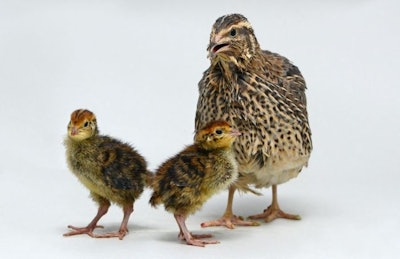
Does stress have an impact on the development in young birds? It may well have, and scientists in Scotland are hoping to find out if early life experiences alter their eating behavior.
In humans, it is well-known that early life stresses can lead to a variety of mood and anxiety disorders, and in later years, stress has been associated with a whole variety of conditions. But what about in our juvenile feathered friends?
While a producer may well be able to understand stress levels in flocks – even when the birds are still quite young – and take remedial action, this is not so easy if chicks are still tucked away in their eggs or have just hatched.
A research team at the Roslin Institute has now, however, received funding to look into whether brain circuits linked to hunger and satiety in quail are affected by stress in early life. Quail were chosen because they hatch well-developed and active, but the team will look at both embryos and chicks to compare the biological pathways for hunger and satiety in the brains of birds that have been exposed to stress and in those that have had a better start in life.
Consequences of a poor upbringing
Stress can have lifelong consequences for birds and is already linked to survival, breeding success, productivity and the health of offspring.
Part of this new study will look at the effect of corticosterone on fertilized eggs, mimicking the hormone signal deposited by stressed mothers into their eggs and its impact on newly-hatched chicks. The researchers will examine whether these stressed lead to cells sensitivity to glucose, which might alter birds’ metabolism
Glucose levels in birds brains are much higher than in mammals, indicating that glucose regulation may be more important in birds than in mammals.
The institute believes that the study could result in findings that lead to better flock management techniques with both productivity and welfare benefits, and calmer birds.


















